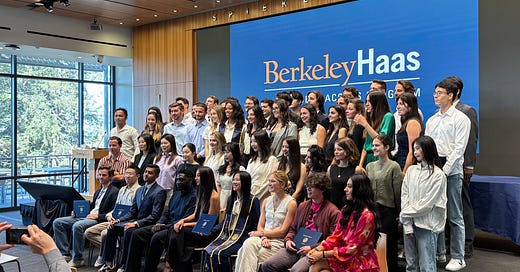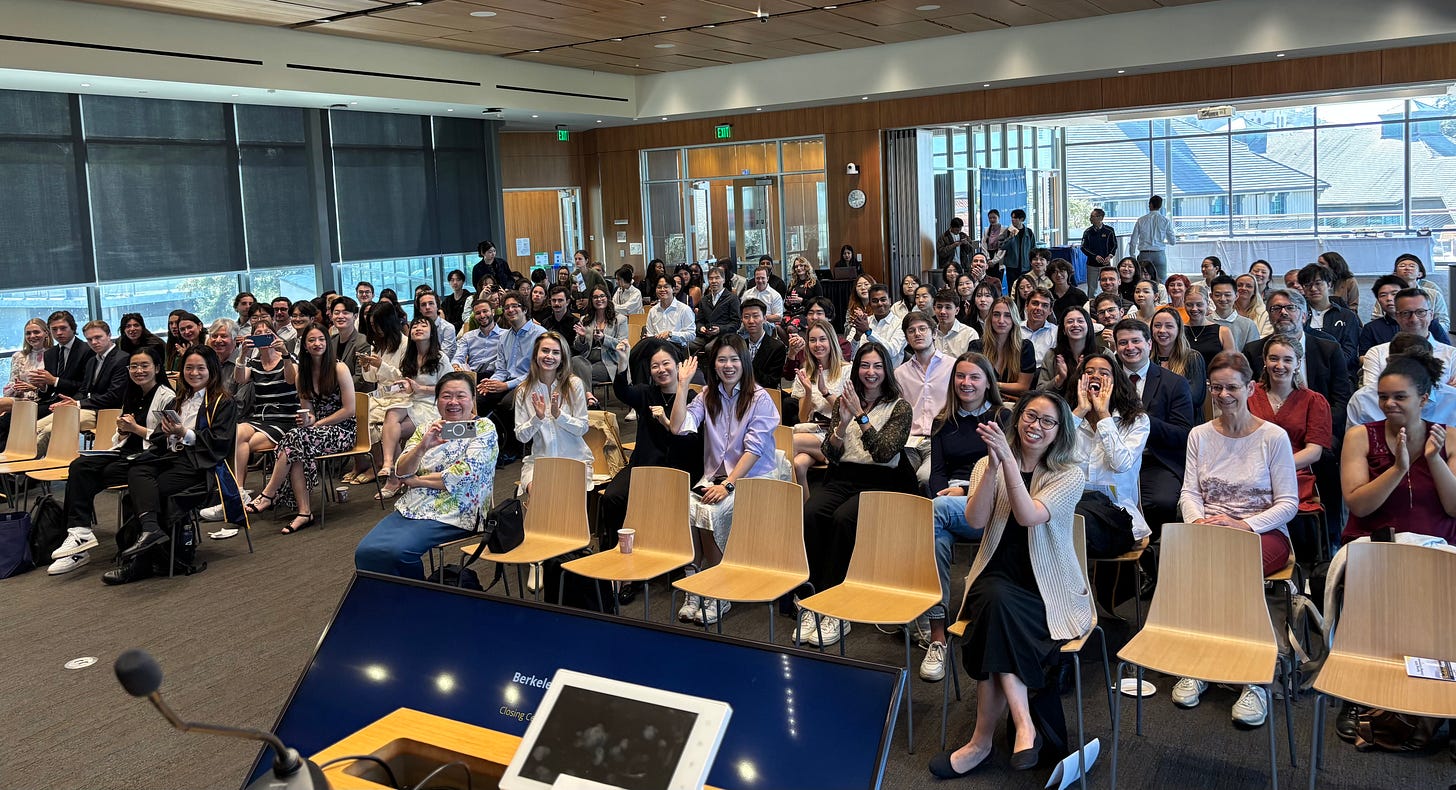Lighting the candle
And the golden light of NorCal ☀️- words of benediction at BHGAP commencement
Friends, it’s that time of year.
Now, MBA commencement isn’t until May 23. But it’s that time - spring (and spring pollen! 🤧) has sprung, and it’s a time to both wrap up loose ends and celebrate new beginnings. Commencement season is always my favorite time on campus- seeing students with their families and loved ones is a reminder of the why - why we congregate here, on campus, and in the end, what it’s all for.
It’s been a minute since my last post. A warm welcome to new subscribers! 👋
By way of introduction: I’m faculty at the Haas School of Business. This spring semester I taught:
Strategy for the Networked Economy (S4NE; two sections)
Opportunity Recognition: Technology & Entrepreneurship in Silicon Valley
Past/recent classes include:
Competitive Strategy
Clusters: Locations, Ecosystems and Opportunity
Business in Japan
Thanks for being here. Looking forward to hearing from you!
A highlight from this spring semester - teaching two sections of Strategy for the Networked Economy (S4NE), one in-person for the Berkeley Haas Global Access Program (BHGAP), one on Zoom for MBAs as part of Haas Flex MBA program. This while also recording asynchronous content modules for the spring 2026 MBA version of S4NE (Ann, Sudeshna, Vaibhavi, Dom, Crystal, Julian, readers S4NE present and recent past; you’ve been on my mind).
I’ve really enjoyed working with the Haas Digital team these past several months. This has been an opportunity to distill the nuggets from a decade-plus of teaching various versions of S4NE, while hopefully leaving a bit of wiggle room based on class interests and changes in the market.
I mentioned BHGAP. This semester, I had the pleasure of teaching in the Berkeley Haas Global Access Program (BHGAP) for the first time.
BHGAP was started in 2017 and is administered via Berkeley Extension. Students - undergraduate and graduate - come from a variety of partner institutions, such as EDHEC Business School. The student population thus differs from full-time MBA program, which is about 40% international, and from evening/weekend MBAs, who are, by definition, working professionals.
In terms of languages heard in the BHGAP classroom, perhaps during breaks (just during breaks, of course 😉), French and Chinese index heavily. This has caused some reflection about my language study choices over the years 😅 (in chronological order: Latin, Japanese, a semester of college Chinese, household Hindi…).
On Friday May 9, I had the pleasure of providing the faculty keynote at the BHGAP commencement ceremony at Spieker Forum at the Haas School of Business. Here’s the view from the podium. (Had to take it, so my kids would believe me.)
Thanks to Lauren, Drew and the BHGAP team for the invitation. 🙏
10 minutes is the perfect time allocation - just enough time to say something, hopefully meaningful and memorable, but not too long. I’m sharing my remarks here, less a few audibles here and there. Fiat lux.
I’m faculty here in the business school, and teach undergrads and MBAs. I’m also an alum of Berkeley - I did a dual master - an MBA and Asian Studies dual degree, many years ago.
11 years into my teaching journey here on campus - finally - finally! - I had the honor of teaching in the BHGAP program. It has been such a delight! Thank you for having me.
First and foremost, I want to thank you - those commencing - for choosing us. For putting your trust in us. For bringing your good, and thoughtful questions. Thank you. We are richer for the experience, we are richer for your company.
And thank you to the families! I see you here. Thank you for sharing your treasures with us. We live in interesting times. Dynamic times. And I’m sure as parents and caregivers, there have been moments of trepidation. Thank you for the trust.
I spent a year of college in Japan and spent another four years there post-college, studying and working. It was pre-Internet. Pre a lot of things. Pre-Starbucks! For part of it at least. The world was less connected, and less globalized then. I didn’t know that then, but I appreciate it more now.
One of the great insights from that experience: to live abroad is to understand your own country better. I remember having to answer naive questions, basic fundamental questions - about my country. And realizing that I had to my understand my own country better in order to be able to answer those questions!
So I suspect you may see your own countries more clearly, by virtue of having spent time here.
The second insight is that I’m still impacted, and being impacted, by that experience, more than 30 years later. A candle was lit, and it’s still burning. So I suspect you may be aware of changes in yourself - and I suspect you will keep changing, and keep evolving.
As you do - I ask you remember us at Berkeley. Remember the glorious golden light – the sense of possibility - the sense of agency. If there’s nothing else you take away from your time here - remember this - we are all change makers, big and small. We all have agency, and have power.
I look at demographics, and people flows, trade flows, and charts, a lot. Maybe too much!
This might be supply chains - relative national position in semiconductors. Or maybe mobile infrastructure markets. And, as you look at data, and charts, history can look preordained. Like it was meant to be that way.
And it’s important to remember - the history we are living in is a function of decisions made by people. At a local level. Which gets me to my next point.
History is non-linear. We can see ahead a few years, relatively safely. Beyond that? That’s when the non-linearity kicks in.
There are other, more famous versions of this - Bill Gates famously said we overestimate what can happen in two years, and underestimate what can happen in 10. Even in the the past two years - how we live and work has profoundly changed. 10 years from now? We are building that future. You are building that future.
One last point. And here I’m sharing my own mental playbook a bit.
Often times we are faced with chances, with choices. Opportunities that are exciting…but also daunting. We might ask - why me? How can I possibly do this hard thing?
It is in those times I ask two questions: Why me? Well, why not me? (And if not me, then who?)
And then I think through the alternatives. And if I think I can, then I put my hand up. I’ll do it. I can do that.
So I’ll ask you to say it. Why me? Why not me?
Thank you. And congratulations!
BHGAP commencement, graduate cohort
Onward and upward! 🚀
And happy Mother’s Day!
- Jon




